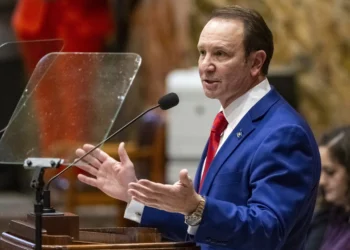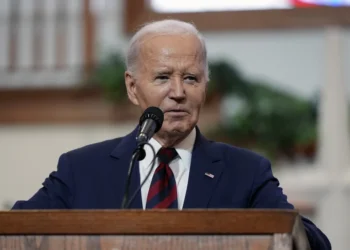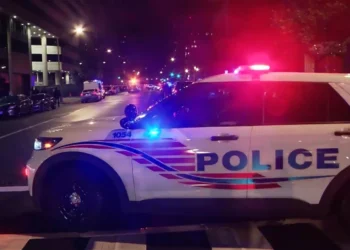Texas Republican Gov. Greg Abbott signed legislation on Saturday to create a $1 billion fund for school voucher programs — the largest day-one school choice bill in the nation’s history.
Abbott was joined by Lt. Gov. Dan Patrick, Texas House Speaker Dustin Burrows, the bill’s author State Sen. Brandon Creighton, and school choice advocates. The governor celebrated the bill’s passage by a vote of 85-63 in the Texas House two weeks ago.
“Today is the culmination of a movement that has swept across our state and across our country,” Abbott said before signing the bill. “A movement driven by parents like Shanira who wanted a better education option for her son who was struggling in a low-performing school; a movement driven by educators like Inge right here, [who] left a teaching position in a public school because he saw that the unique needs of every student simply was not being met, so he started his own private school in Tyler, Texas, to better address those needs.”
“A movement driven by activists across the state, fueled by a vision for an education system that levels the playing field for parents and expands opportunity for our great children; a movement driven by families who shared my vision that it is time we put our children on a pathway to having the No. 1 ranked education system in the United States of America, knowing that school choice is part of the formula of achieving that mission,” Abbott continued.
After signing the bill into law, he put the pen used to sign it into a basket full of pens to be distributed to Texas students present at the bill signing event.
“As kids leave today, they will be able to grab one of those pens,” he said. “One of them is going to get the real pen used to sign this law.”
School choice advocates tout major ‘victory’ for Texas families
The law will create Texas’s first Education Savings Account program, allocating $1 billion in funding beginning in the 2026-2027 school year. All 6 million Texas students would be eligible to apply, with funds usable for private school tuition, tutoring, extracurricular activities, transportation, and special needs therapy.
Students would receive up to $10,800, while those with special needs could receive funding equivalent to what they would get at a public school. Homeschool students would be eligible for up to $2,000.
Advocates have applauded the efforts to make school choice a possibility in Texas, which was a major part of the governor’s agenda. Abbott spent $6 million in 2024 Texas legislature races supporting candidates who vowed to vote in favor of school choice.
“Texas has joined the school choice revolution in true Texas style,” Tommy Schultz, CEO of the American Federation for Children said in a statement to the Washington Examiner. “Parents everywhere deserve access to the school that best suits their children, and today, Texas delivered upon exactly that promise.”
He added, “It cannot be overstated how important this victory is, not only for Texas families but also for parents and students across America, as this victory marks a tipping point for the nation.”
School choice opponents protest ahead of bill signing
However, opponents of the legislation fear it will cause a financial strain on public schools.
Anti-school choice activists hung a banner that reads, “Kids & teachers over billionaires (and those that cave to them)” outside the Texas AFL-CIO building across from the governor’s mansion to protest the bill signing.
“This voucher bill will eventually destroy public schools,” Democratic Rep. Alma Allen said when the bill passed in the Texas House. “I give it 10 years, five sessions from now. Once you open the box, many of these will pop up and will eventually destroy our public schools.”
Eric Duncan, EdTrust’s director of P-12 policy, is highly critical of the school voucher system, saying it takes funding away from low-income schools.
“Most people who use vouchers and use them for their education already have resources,” Duncan previously told the Washington Examiner. “They’re the ones that are already in private schools, and they use those funds to supplement their education.”
Allison Rose Socol, vice president of P-12 policy, practice, and research at EdTrust, echoed a similar sentiment to the Washington Examiner ahead of the bill signing.
“Voucher programs have not been shown to improve academic outcomes for students. To add insult to injury, the Texas program reserves funding for families with incomes above 500% of the federal poverty line, giving precious public dollars to families who can already afford to choose private school,” she said. “This isn’t about expanding opportunity or choice: for students living in poverty across urban and rural communities, and for students with disabilities, diverting limited resources from the public schools they depend on leaves them with nowhere to turn.”
Who benefits most from school choice?
Duncan and Socol’s suggestions run contrary to two of the main goals of school choice proponents: to provide low-income families the means to send their children to better schools and improve academic outcomes.
A recent study on Ohio’s school choice program showed a wide range of positive effects. It found that students benefiting from the program were 60% more likely to earn a bachelor’s degree than their public school peers.
Black students, boys, those raised in poor households, and children who had been labeled as below average academic performers in public schools saw the most improved outcomes.
Numerous other studies have shown school choice programs are linked to an increase in test scores, student safety, and parent satisfaction.
At ACE Scholarships, a school choice scholarship program, the average family income of its students is $60,000.
GOP LAWMAKERS WEIGH PUSHING SCHOOL CHOICE THROUGH WITH RECONCILIATION
The organization is active in 12 states, and in the past 25 years, the nonprofit group has provided over 100,000 scholarships to struggling low-income students who are, on average, two grade levels behind.
Education Secretary Linda McMahon and President Donald Trump have sought to make school choice more widely accessible to American students, with McMahon joining Rep. Burgess Owens (R-UT) on a national tour to promote the Educational Choice for Children Act, which would create a $10 billion tax credit to fund school choice programs. House Republicans are currently working to include the bill in budget reconciliation.

















